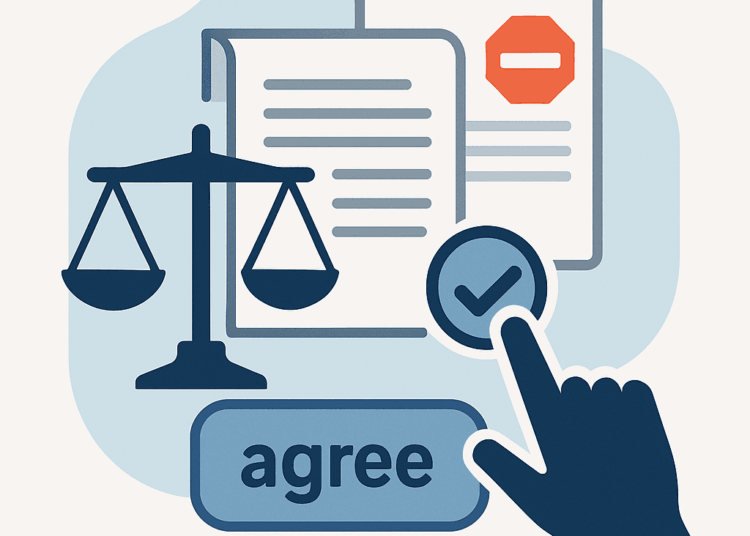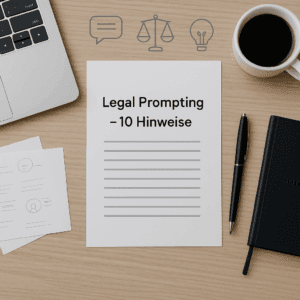No tacit amendment to GTC – silence does not constitute consent
Contract amendment by silence is back in focus. In two recent decisions (November 2024 and June 2025), the Federal Court of Justice (BGH) clarified its case law and made it unmistakably clear that companies must obtain active consent from consumers to changes to their general terms and conditions (GTC). In other words, simply informing customers of changed terms and conditions and then remaining silent is not permissible. What initially emerged from a dispute over bank charges ultimately affects all SaaS and online services that want to change their terms of use. In this blog post, we shed light on the background to the BGH rulings and show what startups now need to bear in mind.
Silence is not consent – BGH clarifies
Back in 2021, the Federal Court of Justice ruled in the highly regarded Postbank judgment: “Silence is not consent ” – at least not in the case of unilateral contract amendments to the detriment of consumers. At the time, the court overturned a clause that required customers to object within two months, otherwise changes would be deemed to have been approved. This so-called fiction of consent was deemed to be incompatible with the principle of good faith. Contractual clauses that define the silence of the contractual partner as acceptance of an offer to amend the contract deviate from fundamental principles of contract law and unreasonably disadvantage consumers.
What is new is that at the end of 2024 and in mid-2025, the Federal Court of Justice reaffirmed and clarified this line. In its ruling of November 19, 2024 (case no. XI ZR 139/23), the XI Civil Senate sent a clear signal: even years of tacit payment of illegally charged fees does not mean that customers have agreed to contract amendments. Silence remains silence – not consent. Consumers can therefore demand the return of unjustifiably collected fees, even if they have not objected for a long time.
In June 2025, the BGH confirmed this course in a model declaratory action against Berliner Sparkasse (judgment of 03.06.2025, ref. XI ZR 45/24). It once again clarified that fictitious consent clauses are invalid vis-à-vis consumers and that there is no legal basis for charges based on them. Important: The mere continued use of a service or unconditional payment does not constitute implied consent if the price or contract change was based solely on an invalid clause. The BGH thus also rejected the idea that consumers had given their tacit consent through years of inactivity – this is not the case.
Incidentally, the BGH also clarified the issue of the statute of limitations in its decision of 2025. Contrary to the hopes of consumer associations, the regular limitation period of three years applies to claims for repayment. This begins at the end of the year in which the fee was paid and shown in the statement of account – not only from the time the ineffectiveness of the clause becomes known. Nevertheless, many bank customers can currently still reclaim fees back to 2022. For our context – the changes to the GTC in general – this limitation issue confirms above all that companies should not rely on consumer rights being extinguished by the passage of time if the basis for the fee was unlawful. Instead of questionable clauses, we need correct procedures for amending contracts.
More than just banks: SaaS and online services affected
Even if the BGH rulings specifically concerned bank fees, their consequences apply across all sectors. This is because the legal basis is general terms and conditions law and consumer protection, not a special statutory rule only for banks. Every startup and every online service that wants to change its terms of use must now pay particular attention. Clauses along the lines of “If you do not notify us, the new T&Cs will be deemed accepted” are invalid – regardless of whether they relate to account fees, software usage contracts or app T&Cs.
Until now, many internet services have relied on emails or in-app notifications along the lines of: “We have changed our terms of service. If you continue to use our service, we will interpret this as consent.” This is now a thing of the past. Even before the new rulings, it was clear that silence in legal transactions does not generally constitute consent. However, the latest BGH rulings put the spotlight on the issue and make it clear that such fictitious consent is not valid, especially when dealing with consumers. Startups should urgently adapt their approach in order to avoid legal pitfalls.
Why is this so important? Suppose a SaaS provider sends out amended terms of use and states that they will apply if users do not object within 4 weeks. A user remains silent and continues to use the service without ever actively saying “yes” to the new terms. Later, the provider wants to invoke a new clause – such as a limitation of liability or a price increase from the amended terms and conditions. The provider would be in a bad position in court: the clause would most likely not have become part of the contract because the required declaration of consent from the customer was missing. In the absence of an effective clause, silence could not be interpreted as consent. In case of doubt, the old agreement would continue to apply – or the clause would be invalid, which in consumer law is usually to the detriment of the company.
Opt-in instead of sitting out: Active consent is mandatory
The solution for companies is: opt-in instead of opt-out. According to the requirements of the Federal Court of Justice, consumers must give their explicit consent for amended contract terms to take effect. In practice, this means that an explicit “yes” from the customer is required – for example by clicking on a checkbox or confirming a pop-up notice about new terms and conditions. Simply sending an amendment email and interpreting silence as consent is not enough (and has never actually been enough).
Startups and online services should therefore consider the following points:
- Clearly inform and obtain consent: Communicate changes to the terms of use unambiguously and offer a simple option for active consent (e.g. “I agree to the updated terms and conditions” button in the login area). The complete new terms and conditions must be brought to the user’s attention before they agree.
- Obtain verifiable consent: Ensure that the consent process is documented (time, type of consent) in order to be able to prove that the customer really consented in the event of a dispute.
- No more “silence as consent”: Refrain from using wording in emails or contract clauses that imply silence or mere continued use as consent. Such clauses are legally ineffective and, in case of doubt, do more harm to your position than good.
- Consider deadline and consequences: Set a reasonable deadline for customers to accept the new T&Cs. Also communicate what will happen if they do not agree. Important: The changes cannot be unilaterally enforced without consent. In extreme cases, you may have to consider terminating the contract or continuing it under the old conditions if an agreement cannot be reached. This step needs to be carefully considered as you don’t want to lose your customers – but legally, a service may terminate the business relationship if no agreement can be reached on changed conditions.
This opt-in procedure ensures that your contract amendments are legally compliant. It also ensures transparency and trust among your users, because nobody likes the feeling of being forced into unwanted conditions through passivity.
Conclusion: Changes only with an active “yes” from the user
For providers of digital services, SaaS start-ups and all companies with consumer contracts, this is the time to act: Changes to terms and conditions need the active consent of customers. The Federal Court of Justice has once again made it clear that tacit consent clauses are invalid and, in case of doubt, no new contract will be concluded unless the consumer has expressly consented. Startups should see this as a wake-up call to adapt their processes. Because regardless of whether it concerns fees, usage rules or other contractual conditions – customer silence should no longer be misunderstood as a golden blank cheque.
Instead, the motto is: ask instead of imply. Proactively obtain the consent of your users. At first glance, this may seem more cumbersome than the old “fictitious consent”, but it creates legal certainty and strengthens the customer relationship through fairness and transparency. And ultimately, it also shows that you take current developments in consumer protection seriously – which can only improve your image.
In short: Don’t be afraid of the extra click! Better one more checkbox than ending up looking old in court. The BGH rulings of 2024/25 have clearly shown that the future belongs to opt-in solutions – in banks, in the tech industry and everywhere else where terms and conditions are changed. So stay on the safe side and get the “yes” from your customers before you try to enforce new clauses. Because silence may sometimes be consent – but not in consumer law. The following applies here: only consent makes the change effective.








